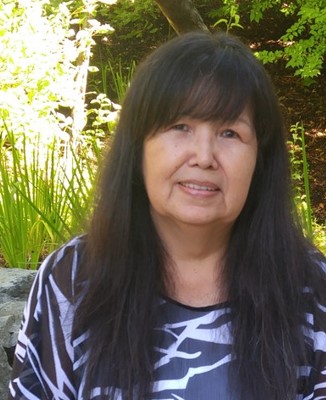Meet our faculty

Mary Stewart, MA
Associate Professor, Halq'eméylem
Modern Languages
Chilliwack campus at CEP, CEP A1454
Phone: 604-792-0025 x2458
email MaryBiography
- 1994, I started my journey of learning Upriver Halq’eméylem, this first cohort consisted of twenty students. We were fortunate to be trained by fluent Upriver Halq’emylem Elders. In 2020, there is only one remaining active fluent speaker.
-I have been teaching the Upriver Halq’eméylem for the past twenty-two years. The first ten years, I developed and implemented Upriver Halq’eméylem within Stó:lō’s Early Childhood daycare, preschool and family-oriented programs. From 2013 to present, I teach Upriver Halq’eméylem 101,102,201 and 202 at the University of the Fraser Valley. I started out as a seminar assistant, then sessional and now Assistant Professor.
- I was so excited to register for the Upriver Halq’eméylem, this has always been my dream. As I was growing up, non-First Nations would ask me, “Do you know your language?” and I would reply, “No”. At this time, I did not understand how my people lost their language. My grandparents would utter a few Halq’eméylem words and I would think that is different. Then, I found out why I was called, Mali, this is a direct transcription for Mary. Later in my life, I discovered how the Stó:lō had lost their language, through the Indian Residential schools; they were prohibited from speaking their language. I took Halq’eméylem to merely learn the language, the Elders kept on telling us students you will be teachers of the Upriver Halq’eméylem. I remember one day, the Stó:lō Shxwelí language program coordinator told me to apply to teach Halq’eméylem level 3 within our community. I have gained so much in learning my language, honoured to have sat with the Elders who also shared our cultural ways. My Elder teachers were so humble and loving. And one of the biggest messages I have received from the Elders is to teach the language with love! As well, they told us as students, that we each have a gift or more than one gift within the language. For example, I have seen some of my colleagues who can sing the traditional and contemporary songs, and by memory. For me, I think one of my gifts is to write the Upriver Halq’eméylem, and to continue expanding my knowledge, oral proficiency and sharing the Upriver Halq’eméylem language. I now pass down these messages to my students. I have seen so much healing that happens when our people are learning the Upriver Halq’eméylem, especially, those who went to Indian Residential School.
Education
- Master of Arts, Simon Fraser University; focus on linguistics and language revitalization of First Nation Languages; inclusion of Upriver Halq’eméylem.
- Master of Education, Simon Fraser University, focus on First Nation pedagogies and curriculum.
- Development Standard Teaching Certificate, Simon Fraser University.
- First Nation Language Proficiency Certificate, Simon Fraser University; in the Upriver Halq’eméylem language; consisted of nine linguistic courses focusing on the Upriver Halq’eméylem.
- Four additional Upper Level Linguistic courses, Simon Fraser University; examining Stó:lō storytelling, language revitalization and field study.
- Seven courses in Upriver Halq’eméylem, University of the Fraser Valley.
- Informal Upriver Halq’eméylem courses, Stó:lō Shxwelí Halq’eméylem Language Program: Level 1=600 hours, Level 2=360 hours, Level 3 =240 and Level 4=144 hours.
Teaching Interests
- Exploring the more contemporary teaching methods that will inspire students to speak the language. For example:
- AIM (Accelerated Integrated Methodology): using gestures is an integral part of learning a second language
- WAYK (Where are your Keys): use of gestures
- In 2009, I developed a preschool Halq’eméylem Immersion program. This was the first type of immersion preschool to be provided within the Stó:lō territory. We received support from the Simon Fraser University professors, Dr. Margaret MacDonald, and Dr. Daniele Moore. This program was one of ten community programs selected to represent an immersion type of programming in a DVD called, "The Language Nest Story", 2010 by First Peoples' Cultural Foundation, available on YouTube.
